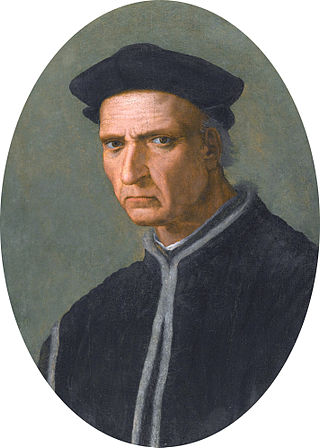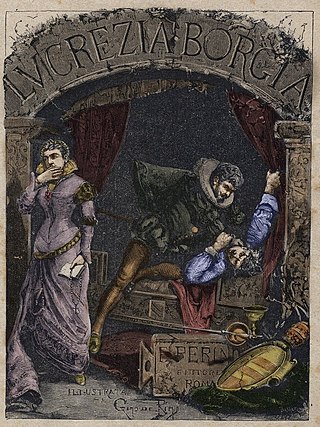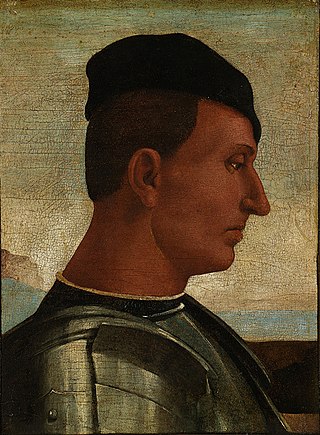Related Research Articles

Cesare Borgia was a Roman Catholic deacon—cardinal and later an Italian condottiero (mercenary). He was the illegitimate son of Pope Alexander VI of the Aragonese House of Borgia and was a sibling to Lucrezia Borgia.

Lorenzo di Piero de' Medici, known as Lorenzo the Magnificent, was an Italian statesman, the de facto ruler of the Florentine Republic, and the most powerful patron of Renaissance culture in Italy. Lorenzo held the balance of power within the Italic League, an alliance of states that stabilized political conditions on the Italian Peninsula for decades, and his life coincided with the mature phase of the Italian Renaissance and the golden age of Florence. As a patron, he is best known for his sponsorship of artists such as Botticelli and Michelangelo. On the foreign policy front, Lorenzo manifested a clear plan to stem the territorial ambitions of Pope Sixtus IV, in the name of the balance of the Italic League of 1454. For these reasons, Lorenzo was the subject of the Pazzi conspiracy (1478), in which his brother Giuliano was assassinated. The Peace of Lodi of 1454 that he supported among the various Italian states collapsed with his death. He is buried in the Medici Chapel in Florence.

Niccolò di Bernardo dei Machiavelli was a Florentine diplomat, author, philosopher, and historian who lived during the Italian Renaissance. He is best known for his political treatise The Prince, written around 1513 but not published until 1532, five years after his death. He has often been called the father of modern political philosophy and political science.

Cosimo I de' Medici was the second and last duke of Florence from 1537 until 1569, when he became the first grand duke of Tuscany, a title he held until his death. Cosimo I succeeded his cousin to the duchy. He built the Uffizi (office) to organize his administration, and conquered Siena to consolidate Florence's rule in Tuscany. He expanded the Pitti Palace and most of the Boboli Gardens were also laid out during his reign.
This article contains information about the literary events and publications of 1520.

Piero di Tommaso Soderini, also known as Pier Soderini, was an Italian statesman of the Republic of Florence.

Vitellozzo Vitelli was an Italian condottiero. He was lord of Montone, Città di Castello, Monterchi and Anghiari.

Giovan Luigi "Chiappino" Vitelli was an Italian nobleman and military leader who was Marquis of Cetona. He became a general and diplomat for Charles V, Holy Roman Emperor and stayed in the service of his son, Philip II of Spain, serving as Governor of Piombino and as Spanish ambassador to England. He was reputed to be one of the best Italian soldiers of his time, "the living embodiment... of the political and military success of ducal Florence".

Oliverotto Euffreducci, known as Oliverotto of Fermo, was an Italian condottiero and lord of Fermo during the pontificate of Alexander VI. His career is described in Niccolò Machiavelli's Il Principe.
Nationality words link to articles with information on the nation's poetry or literature.
Nationality words link to articles with information on the nation's poetry or literature.
On the method of dealing with the Rebellious Peoples of Valdichiana is a 1503 work by Niccolò Machiavelli.
A Description of the methods adopted by the Duke Valentino when murdering Vitellozzo Vitelli, Oliverotto da Fermo, the Signor Pagolo, and the Duke di Gravina Orsini often abbreviated as The Description for reasons of brevity, is a work by Italian Renaissance political scientist and historian Niccolò Machiavelli. The work describes the methods used by Cesare Borgia to capture and murder members of the Orsini family, a princely family of Renaissance Rome. Both Vitellozzo Vitelli and Oliverotto da Fermo were strangled on the night of their capture on 31 December 1502.

This timeline lists important events relevant to the life of the Italian diplomat, writer and political philosopher Niccolò di Bernardo dei Machiavelli (1469–1527).

Bernardo Rucellai, also known as Bernardo di Giovanni Rucellai or Latinised as Bernardus Oricellarius, was a member of the Florentine political and social elite. He was the son of Giovanni di Paolo Rucellai (1403–1481) and father of Giovanni di Bernardo Rucellai (1475–1525). He was married to Nannina de' Medici, the elder sister of Lorenzo de' Medici, and was thus uncle to Popes Leo X and Clement VII, who were cousins. Oligarch, banker, ambassador and man of letters, he is today remembered principally for the meetings of the members of the Accademia Platonica in the Orti Oricellari, the gardens of his house in Florence, the Palazzo Rucellai, where Niccolò Machiavelli gave readings of his Discorsi.

Micheletto Corella was a Valencian condottiero born on an unknown date in Valencia. He was killed in Milan in February 1508.

Paolo Vitelli was an Italian knight and condottiero as well as lord of Montone. He was born in Città di Castello, which had been captured by his father, Niccolò Vitelli. He was the brother of Vitellozo and Chiappino, both condottieri. He worked as a mercenary for the republic of Florence, where he was later suspected of treachery and executed. This led his brother Vitellozzo to repeatedly assail Tuscan properties.

Camillo Vitelli was an Italian knight and condottiero of the Vitelli family. He was born in Città di Castello as the son of Niccolò, making him brother to Paolo, Giulio, Giovanni and Vitellozzo. He was also brother-in-law to Giampaolo Baglioni. He became marquess of Sant'Angelo dei Lombardi and duke of Gravina in Puglia. In a battle near Lucera he became the first person to use an arquebus on horseback. He died in Circello and was the father of Vitello Vitelli, another condottiero.
Paolo Orsini was an Italian condottiero in the service of the Papal States, Ferdinand of Aragon and the Republic of Florence. He was marquess of Atripalda and lord of Mentana, Palombara Sabina and Selci.
References
- ↑ Martin Gosman; A. Alasdair A. MacDonald; Alasdair James Macdonald; Arie Johan Vanderjagt (1 October 2003). Princes and Princely Culture: 1450-1650. BRILL. p. 161. ISBN 90-04-13572-3.
- ↑ Thomas (à Kempis); William C. Creasy (2007). The Imitation of Christ by Thomas a Kempis: A New Reading of the 1441 Latin Autograph Manuscript. Mercer University Press. pp. 22–. ISBN 978-0-88146-097-1.
- ↑ British Museum. Dept. of Printed Books (1816). Librorum Impressorum Qui in Museo Britannico Adservantur Catalogus. p. 310.
- ↑ Niccolò Machiavelli (1873). Le opere di Niccolò Machiavelli ... Tipografia Cenniniana. pp. 50–.
- ↑ Jean Jules Jusserand (1895). A Literary History of the English People ... G. P. Putnam's sons. p. 511.
- ↑ North Carolina Studies in the Romance Languages and Literatures. University of North Carolina. 1973. p. 79. ISBN 978-0-8078-9217-6.
- ↑ Nick Evangelista (1995). The Encyclopedia of the Sword. Greenwood Publishing Group. p. 504. ISBN 978-0-313-27896-9.
- ↑ Rowland Freeman (1821). Kentish poets, a series of writers, natives of or residents in Kent; with specimens of their compositions, and some account of their lives and writings, by R. Freeman. p. 1.
- ↑ Claudio Finzi. "Pontano, Giovanni". Dizionario-Biografico (in Italian). Treccani. Retrieved March 29, 2021.